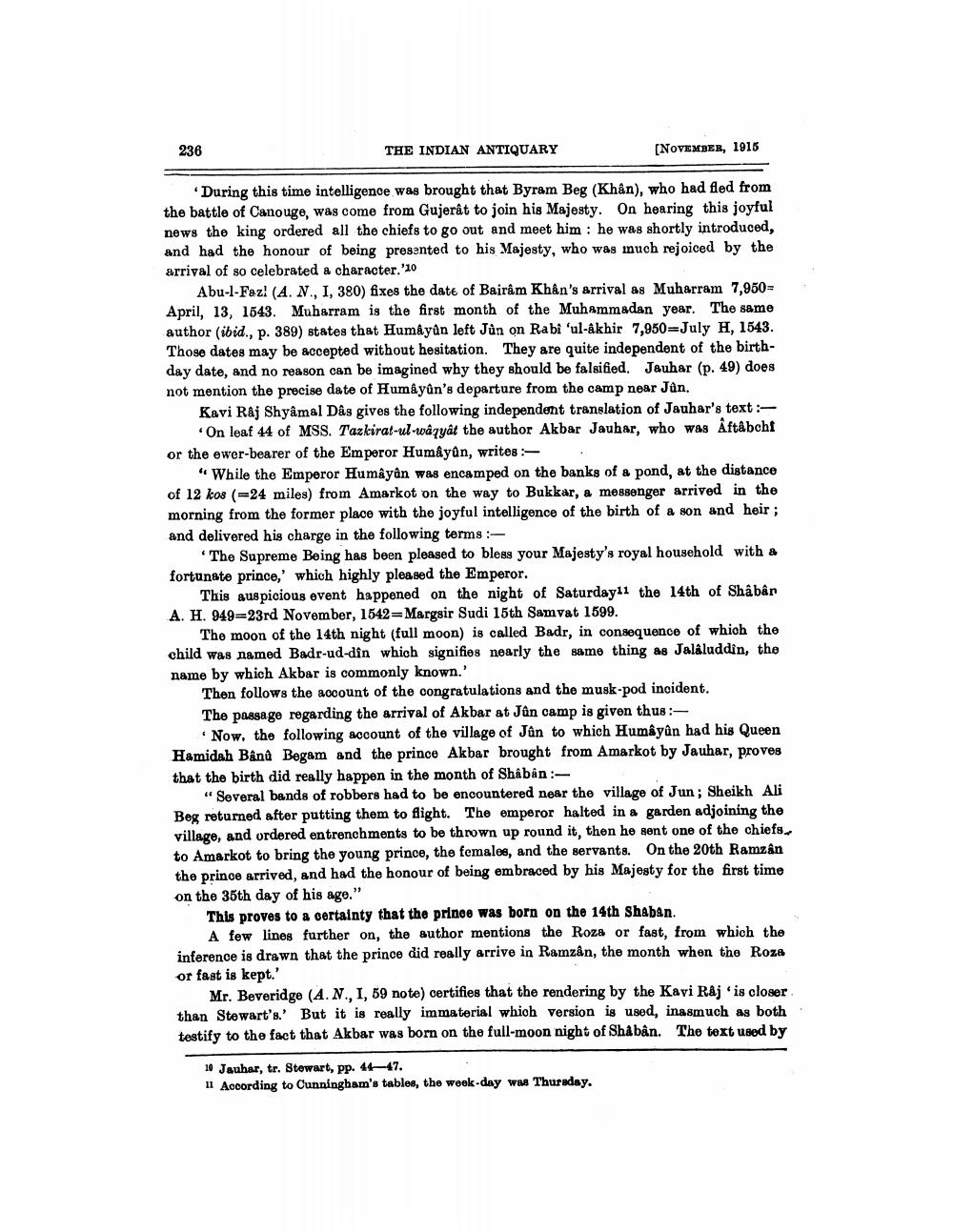________________
236
THE INDIAN ANTIQUARY
(NOVEMBER, 1915
During this time intelligence was brought that Byram Beg (Khân), who had fled from the battle of Canouge, was come from Gujerât to join his Majesty. On hearing this joyful news the king ordered all the chiefs to go out and meet him : he was shortly introduced, and had the honour of being presented to his Majesty, who was inuch rejoiced by the arrival of so celebrated a character.'10
Abu-l-Faz! (A. N., 1, 380) fixes the date of Bajram Khan's arrival as Muharram 7,950April, 13, 1643. Muharram is the first month of the Muhammadan year. The same author (ibid., p. 389) states that Humâyûn left Jûn on Rabi'ul Akhir 7,950=July H, 1543. Those dates may be accepted without hesitation. They are quite independent of the birthday date, and no reason can be imagined why they should be falsified. Jauhar (p. 49) does not mention the precise date of Humâyûn's departure from the camp near Jûn.
Kavi Raj Shyamal Das gives the following independent translation of Jauhar's text :
On leaf 44 of MSS. Tazkirat-ul-waqyât the author Akbar Jauhar, who was Aftâbchf or the ewer-bearer of the Emperor Humayûn, writes
" While the Emperor Humâyân was encamped on the banks of a pond, at the distance of 12 kos (=24 miles) from Amarkot on the way to Bukkar, a messenger arrived in the morning from the former place with the joyful intelligence of the birth of a son and heir ; and delivered his charge in the following terms:
The Supreme Being has been pleased to bless your Majesty's royal household with a fortunate prince,' which highly pleased the Emperor.
This auspicious event happened on the night of Saturdayil the 14th of Shâbân A. H. 949=23rd November, 1542=Margsir Sudi 15th Samvat 1599.
The moon of the 14th night (full moon) is called Badr, in consequence of which the child was named Badr-ud-din which signifies nearly the same thing as Jalaluddin, the name by which Akbar is commonly known.'
Then follows the account of the congratulations and the musk-pod incident. The passage regarding the arrival of Akbar at Ján camp is given thus :
Now, the following account of the village of Jûn to which Humâyân had his Queen Hamidah Bânů Begam and the prince Akbar brought from Amarkot by Jauhar, proves that the birth did really happen in the month of Shaban :
"Several bands of robbers had to be encountered near the village of Jun; Sheikh Ali Beg returned after putting them to flight. The emperor halted in a garden adjoining the village, and ordered entrenchments to be thrown up round it, then he sent one of the chiefs. to Amarkot to bring the young prince, the females, and the servants. On the 20th Ramzan the prince arrived, and had the honour of being embraced by his Majesty for the first time on the 35th day of his age."
This proves to a certainty that the prince was born on the 14th Shaban.
A few lines further on, the author mentions the Roza or fast, from which the inference is drawn that the prince did really arrive in Ramzân, the month when the Roza or fast is kept.'
Mr. Beveridge (A.N., I, 59 note) certifies that the rendering by the Kavi Raj 'is closer than Stewart's.' But it is really immaterial which version is used, inasmuch as both testify to the fact that Akbar was born on the full-moon night of Shâbân. The text used by
10 Jauhar, tr. Stewart, pp. 46–47. 11 According to Cunningham's tables, the week-day was Thursday.




